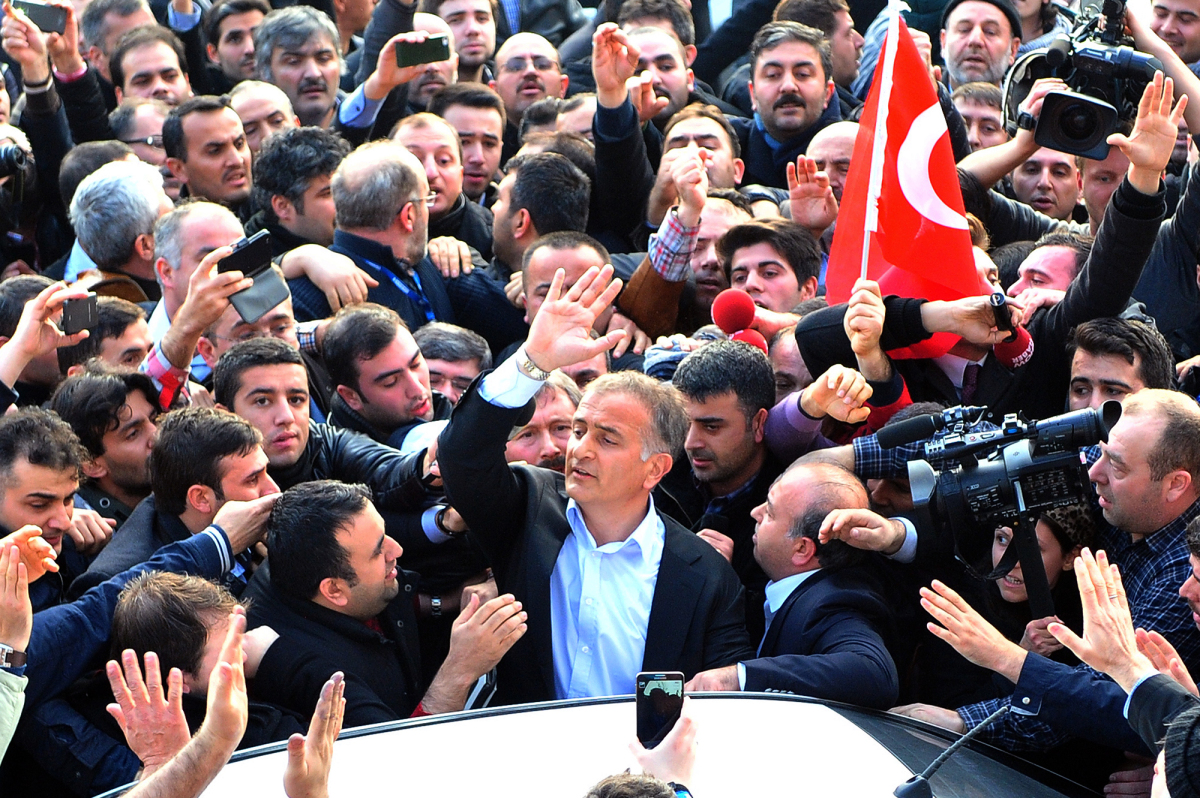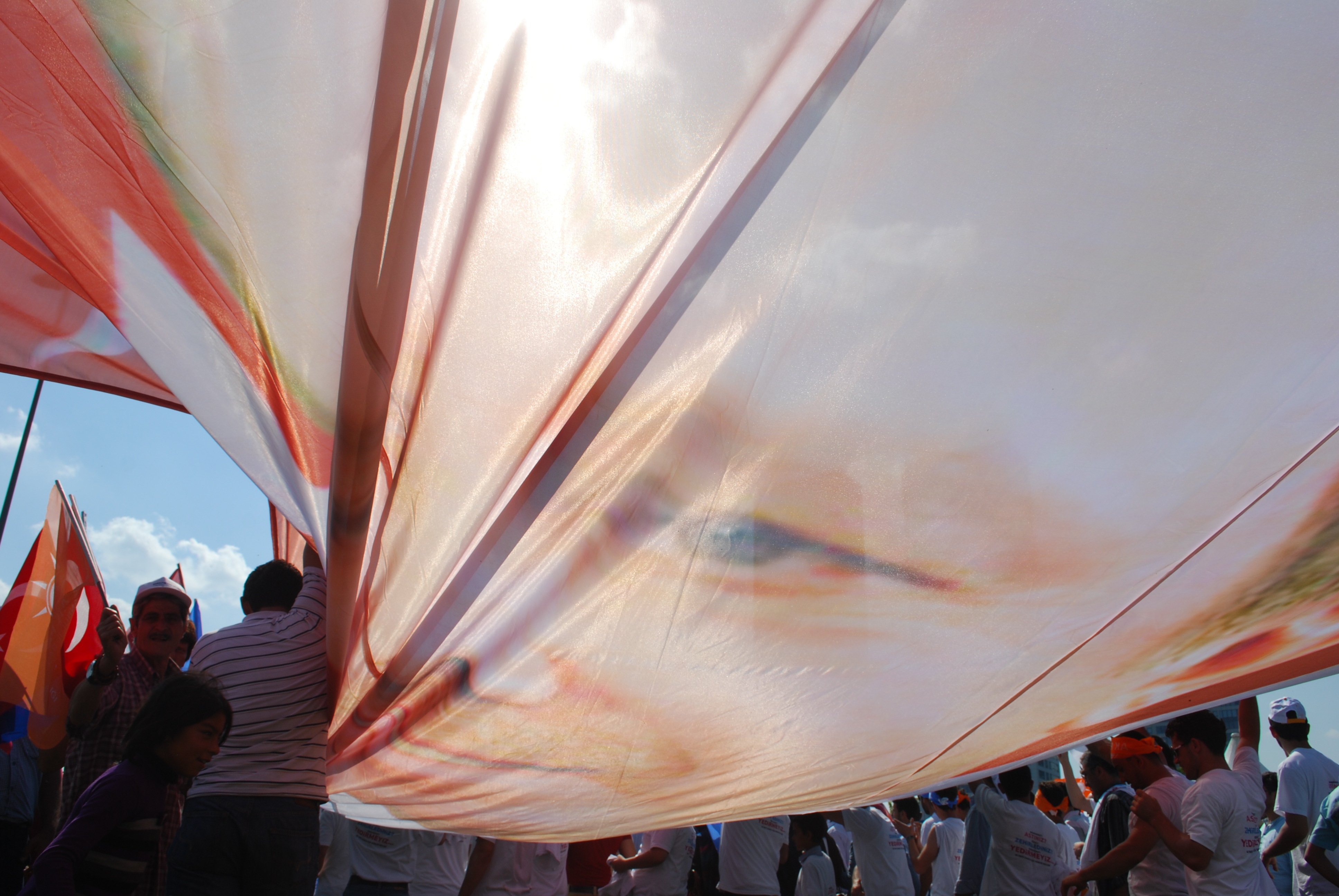
Late last Saturday night, Celil Sağır left his home, in an Istanbul suburb, for the offices of the Turkish media group Zaman, where he works as the managing editor of the English-language daily Today's Zaman. Earlier that week, an anonymous Twitter user, going by the name Fuat Avni, who claims to be part of President Recep Tayyip Erdoğan's inner circle, had warned that there would be a police operation against media outlets that were seen to be loyal to Fethullah Gülen, a Pennsylvania-based Turkish imam whose vast network of followers occupy influential roles across Turkish institutions, including government and media. On Saturday, Fuat Avni followed up with details, predicting that the raid would happen that weekend. Staff from Zaman, which operates a variety of media outlets, including a Turkish-language newspaper, flooded the office to prepare.
When I reached Sağır late Sunday morning, by phone, he sounded worried. "After December 17th, we cannot talk about a democratic country where there is rule of law," he told me, referring to the day, in 2013, that marked the beginning of a sweeping investigation into corruption among business leaders and government officials close to Erdoğan. "You can expect anything to happen arbitrarily."
On that day, almost precisely a year ago, Gülen's once-strong alliance with Erdoğan collapsed in a spectacular fashion. Reports of the scandal included details of morning police raids on people associated with Erdoğan's Justice and Development Party (A.K.P.), money stuffed into shoeboxes, and leaked phone conversations that sounded like confessions of corruption at the highest level of government. The A.K.P. claimed that all this had been orchestrated by Gülen's wide network of followers, the climax of a standoff between two influential figures in their bids for authority over Turkish business and politics. Erdoğan accused Gülenists of plotting to overthrow Turkey's democratically elected government, and moved to reassert his control over the police and the judiciary. Anything linked to the imam was suspect, including media outlets operated by Zaman, whose owners are affiliated with Gülen. Zaman is regarded by the A.K.P. as part of a "parallel state," which it claims was plotting a coup.
The Zaman building is off a highway near the Ataturk airport, far from central Istanbul. To enter, you have to cross a short covered bridge, which takes you over a moatlike ring of gardens. Inside, the office is open and gleaming, full of cubicles and meeting rooms with glass walls. On Saturday night, Sağır arrived to find much of the staff already there, arranging themselves in what he called "a civil protest" against the police. Ekrem Dumanlı, the editor-in-chief of Zaman's Turkish-language paper had been identified by Fuat Avni as a target, and he awaited arrest in his office.
The first wave of police officers arrived early Sunday morning. They were met with hundreds of journalists and other supporters of Zaman, holding protest signs that read, in Turkish and English, "FREE MEDIA CANNOT BE SILENCED." The police retreated, and Dumanlı sent out a victorious tweet suggesting that they had been forced back by the protesters, whom he called "my friends."
Sağır stayed in the office overnight, but he did not sleep. "Erdoğan wants to silence outspoken journalists and all free media," he said. "This is what we witnessed during military rule. These kinds of things should not happen under civilian rule." Sağır and other Zaman journalists reported the story as it unfolded, running pieces online, posting updates on social media, and preparing reports for the print edition of the paper. "Morale is very high because it is a ridiculous case, a very ironic case," Sağır said. "In terms of journalism, this is an invaluable experience. The situation itself is newsworthy, and we are inside of the news story. But, in terms of freedom of expression, this is a black Sunday." Kemal Kılıçdaroğlu, the head of Turkey's main opposition party, the Republican People's Party (C.H.P.), went even further. "The process we are going through now would not happen in a healthy democracy," he said. "The process we are going through is a coup."
On Sunday afternoon, the police returned to the Zaman office and led Dumanlı out of the building, past protesting supporters and staffers. Hordes of journalists were there to record the actions of the police, Dumanlı's defiance, and the solidarity among Zaman staffers. More than two dozen people were arrested around the country that day, including journalists, media executives, and a screenwriter, all said to be associated with the Gülen movement.
Sağır was pleased with the number of supporters who turned out, but he worried about whether the arrests at Zaman would have a chilling effect on people working at other media outlets. "We are looking for more support," he said. "Journalists are very hesitant about how to cover this issue, because there is immense pressure from Erdoğan. One of the head editors of a daily"—a friend of Sağır's whom he didn't want to name—"just sent me a message saying that he doesn't know how he will cover this issue." He added that the government "is trying to put pressure on every media outlet to cover the raid as if it were an operation against 'a parallel state.' Nothing about the media, nothing about freedoms."
Sağır had another reason to be worried about coverage. Since the A.K.P. came to power, more than a decade ago, Zaman's ties with Gülen have alienated some people in the Turkish media, who consider the company to be guided principally by the imam. When Gülen and Erdoğan were allies, Zaman was pro-A.K.P.; since the split, the paper has become an outspoken critic of the government. Detractors say, for example, that Zaman's coverage of last year's Gezi protests and of the Kurdish issue have reflected Gülen's interests more than the truth on the ground.
Most notorious, though, is Zaman's coverage of the Ergenekon trial, a years-long series of investigations, beginning in 2007, by the A.K.P., with the support of Gülen, of an alleged secret organization believed to be affiliated with Turkey's military and its "deep state." (In an article about Turkey from 2012, Dexter Filkins writes at length about the "deep state," a "presumed clandestine network of military officers and their civilian allies," determined to stifle, often violently, any opposition to the secular government.) Opposition papers focussed on the flaws in the trial, which came to be seen as an attack on anti-government voices, and anti-Gülen ones. (At the time, the two men were united in the attempt to defang the country's overly powerful military apparatus.) Zaman media, in concert with Gülen, tended to champion the trials, highlighting the threat posed by the accused rather than the overreach of the government. Because of Ergenekon, many journalists were threatened, fined, or arrested. The trial concluded, in 2013, with the conviction of nearly three hundred defendants.
Aslı Aydıntaşbaş, a columnist for the newspaper Milliyet, was a prominent media voice at the height of the Ergenekon trials. Back then, she covered the government raids, including those targeting journalists working for Istanbul's OdaTV, a news Web site with a nationalist, anti-A.K.P. bent. The arrests, she told me, were a clear instance of authorities using the trials against the deep state to silence dissent; at the time, journalists responded with expressions of anger and solidarity, but to do so they often had to put aside their feelings about the accused. "I found myself in a situation where I would have to defend the OdaTV people, and I really don't, ideologically speaking, like what they do," Aydıntaşbaş said. "But that does not mean that they were part of a coup d'état against the government, which is what the prosecutors alleged."
Sunday's raids did not immediately provoke the same outrage and solidarity, perhaps because the wounds from Ergenekon were still too raw. The most notable protests have seemed partisan, more in support of Zaman specifically than of press freedoms in general. Although many newspapers have run stories critical of the government, most of the censure has been from international observers, like Human Rights Watch and the Committee to Protect Journalists. "The heavy-handed actions this morning smack of political vengeance," Joel Simon, the executive director of the C.P.J., said.
The A.K.P. might be relying on past grievances to distract from the basic violations of freedom of expression that characterize the arrests. It is in the party's interest to present the raid as an attack on Gülenists, not on journalists. But Zaman is different today than it was a year ago. I first spoke with Sağır in early February, following the deportation of a reporter for Today's Zaman. He defended the independence of the paper, although he did not deny that it had links to the imam. Its journalists were "inspired" by Gülen's teachings, he told me, but they nonetheless considered themselves broadly progressive and had, like many Turks, become disenchanted with the A.K.P. because of Erdoğan's authoritarian policies, not because Gülen no longer supported the President. The idea that Zaman media was intent on overthrowing the government seemed laughable to him. "The government has created its own media," he told me.
Despite Zaman's history, Turkish journalists, even those who are critical of the Gülen movement, or who suffered during the Ergenekon years, have begun to back the Zaman staff. The journalist Ahmet Şık spent a year in prison, in 2011 and 2012, as part of the Ergenekon case, and it is widely believed that his investigative work on the Gülen movement was the real cause of his detention. On Twitter this past weekend, Şık offered wary support for Dumanli, and condemned the Zaman raid (while also recalling a time, not long ago, when the Gülenists had "served Fascism"). Later, a petition to demand the immediate release of the detained journalists, started by Zaman, began slowly garnering signatories from other corners of Turkish media.
Aydıntaşbaş, for her part, was aware of the risks of calling out the government, and of defending Zaman. "You will be accused of being part of a parallel state," she said. But she also appreciated the need for solidarity among Turkey's journalists in the face of A.K.P. authoritarianism. The arrests of the editor-in-chief of a major newspaper constituted a clear attack on freedom of expression, regardless of the paper's political leanings. "It's a very difficult dilemma for us, because we are fully aware that Zaman was silent during [Ergenekon]. They were not only silent, but also complicit," she said. "They applauded the arrests. We are very aware of that. But today is a different matter."



